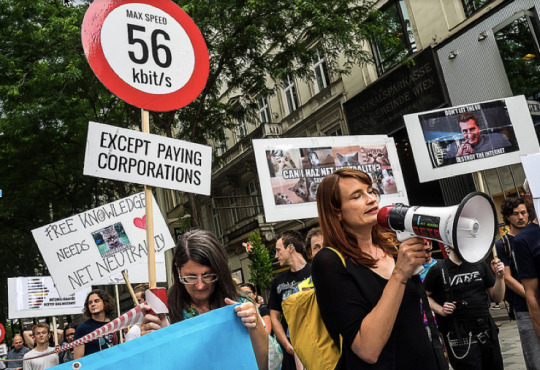PHOTOS: Wikimedia Austria, Akvorrat, Internet Users, and Others Demonstrate Outside Net Neutrality EU Commission Plenary Talks to Demand Real Protections for EU Internet
Hundreds protest weak EU net neutrality proposals carrying giant speed limit signs and relegating Internet users to a “slow lane.”

View more photos here: https://www.flickr.com/photos/akvorrat_at/albums/72157669189677326
Concerned Internet users and digital rights supporters gathered on Friday 6 June at the headquarters of the Austrian Telecom Regulator in Vienna (RTR, Mariahilferstraße 12-14, Vienna). This meeting helped to kick off a public consultation on net neutrality in the European Union that starts today and ends on July 21, 2016.
Photos submitted from protests can be seen here: https://www.flickr.com/photos/akvorrat_at/albums/72157669189677326
The fight for net neutrality has moved from the United States, Brazil, India and now on to the European Union. As net neutrality policies are being decided around the world, what happens in the EU will have a major influence on how the US will deal with zero rating programs, which effectively create fast lanes for web content that pay against data caps, and on net neutrality policies that are being decided now in countries that have yet to have a similar fight.
“People are rallying in Vienna to defend the internet in the upcoming EU net neutrality rules. The public interest and the public voice must be heard.” said Thomas Lohninger, privacy activist at the civil liberties organisation AKVorrat. “Net neutrality is what has made the Internet thrive and grow all over the world, and the European union cannot lag behind. If we allow telecoms to treat Internet traffic differently based on who can pay, we will create an Internet with fast lanes and slow lanes, stifling free speech and innovation. If the rules are passed, we could be shutting down the next best invention for the world without even knowing it.”
Protesters opposed proposals to weaken net neutrality rules, holding "Save the Net” signs and unfurling a slow lane across the square to demonstrate what the Internet will be like for the “have-nots” in the future, along with traffic signs that read 56kb/s for everyone except paying corporations.
The rally was organized by several civil society organisations in Austria, including Netzfreiheit, AKVorrat, Wikimedia Austria, Open Knowledge Austria, and other advocacy organizations.
For the latest on upcoming events: SavetheInternet.EU
“The fight for net neutrality has arrived in Europe and we can’t stand to lose protections for it. People care deeply about this issue and are even showing up in person to protest bad loopholes for telecoms,” said Lohninger. “The whole world is watching EU’s ability to pass strong policy in the face of heavy industry lobbying, and people will be standing up in the coming days to make sure that doesn’t happen. We won’t allow the EU to turn out to be more lobbyist friendly on this key issue than the US or India.”
“Because of the importance of the EU as a market, if we lose meaningful net neutrality there it will have a huge impact globally, both on the policy process in other countries but also on the course of the Internet itself. If the rules give an edge to big established sites with the ability to make special deals (e.g. Google and Facebook) that makes those sites harder to compete with, globally, and it will tilt the Internet’s future in the direction of big corporations”, said Holmes Wilson, Co-Director of Fight for the Future.
For interviews with activists from the European Net Neutrality movement, please email press@fightforthefuture.org.
###
Fight for the Future is a digital rights nonprofit with more than 1.4 million members that works to defend the Internet as an open and powerful platform for freedom of expression. They are best known for organizing the largest online protests in history against SOPA, for net neutrality, and against government surveillance. Learn more on twitter or at FightForTheFuture.org.

